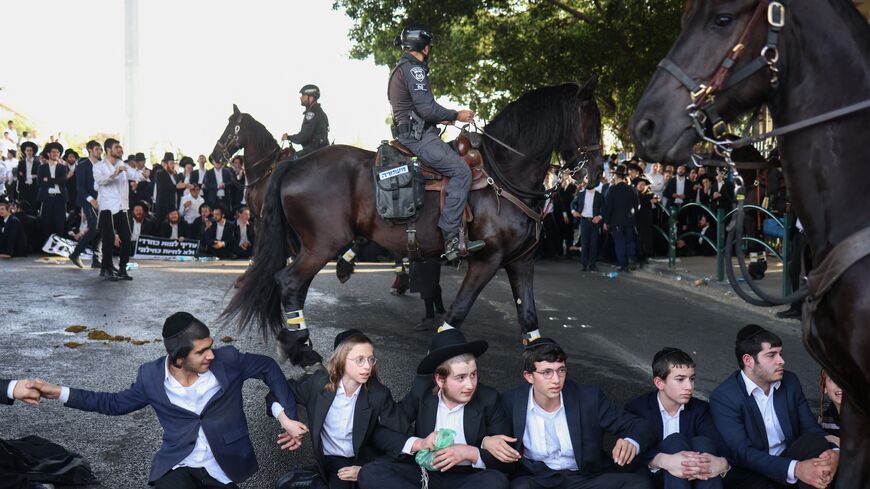Israeli demonstrations turn violent as ultra-Orthodox protest draft
Protests broke out in Israel over the weekend over thousands of ultra-Orthodox facing the draft.

Israeli Defense Minister Yoav Gallant is trying to reach a compromise with the ultra-Orthodox parties over the issue of military conscription after thousands of ultra-Orthodox demonstrated violently Sunday, demanding that yeshiva students continue to be exempted from military service.
Speaking at a meeting of the Knesset’s Foreign Affairs and Defense Committee on Monday, Gallant said that an estimated 10,000 additional soldiers are urgently needed for the Israeli military to be able to operate on the southern and northern fronts simultaneously. Gallant told the committee that the Israel Defense Forces will draft 3,000 ultra-Orthodox men immediately upon approval by the government.
Gallant's statement suggests that the military has made preparations to establish separate army units that would not include women and would meet the kosher requirements of the ultra-Orthodox community.
Gallant recommended that the number of ultra-Orthodox drafted increase by 5% every year for the next five years, noting that a bipartisan agreement will be needed to reach a compromise.
Violent demonstration in Jerusalem
Several ultra-Orthodox groups demonstrated Sunday in central Jerusalem against the June 25 ruling by the Supreme Court on drafting yeshiva students. The protest started as two separate rallies, each organized by a distinct Hasidic court, but later on the two rallies merged in a rare show of unity by a community that is normally split into rival streams.
Signs carried by the protesters read, "No draft to the enemy army" and "The sages have ruled: better to die than be drafted." One protester held a gallows complete with dangling noose. A sign attached read, "Either a Jew or a crucifix: We prefer a bullet to the head over enlisting in the army of annihilation." The demonstration quickly turned violent, with protesters throwing rocks and sticks and the police. Thousands of demonstrators blocked an intersection leading to the heavily ultra-Orthodox neighborhood of Mea Shearim.
Two senior ultra-Orthodox politicians, Housing Minister Yitzhak Goldknopf and former Health Minister Yaakov Litzman were attacked while driving through the area. Protesters threw stones at the cars and police had to rescue the politicians.
Police said in a statement that protesters threw objects at officers and set trash bins on fire. Several officers were reported injured during the clashes, including a woman who was struck in the head by a thrown object. At least five people were arrested for breaching public order.
Rally against Supreme Court
Exemption from military service has long been at the heart of ultra-Orthodox politics and several laws and regulations have addressed the issue over the years. The ultra-Orthodox leadership holds that the community's young men must study the Torah and not serve in the military, which they're afraid will expose them to the outside world and lead them to abandon their religious lifestyle.
Since the Oct. 7 assault by Hamas and the ensuing deaths of hundreds of IDF soldiers in Gaza, calls within Israeli society against exemption for young ultra-Orthodox men have grown considerably louder. More than 60,000 young ultra-Orthodox men meet the physical requirements for conscription. Despite the calls, the ultra-Orthodox community refuses to budge.
On June 25, the court ruled that since a temporary law exempting yeshiva students had expired a year ago, the IDF must now start calling them up for duty.
Following the ruling, Prime Minister Benjamin Netanyahu's ultra-Orthodox allies have threatened to leave his government if a new law is not passed to exempt this population, and negotiations are still ongoing within the coalition on a compromise. Should the ultra-Orthodox parties leave, Prime minister Benjamin Netanyahu would lose his Knesset majority, his government will fall and new elections will be called.








